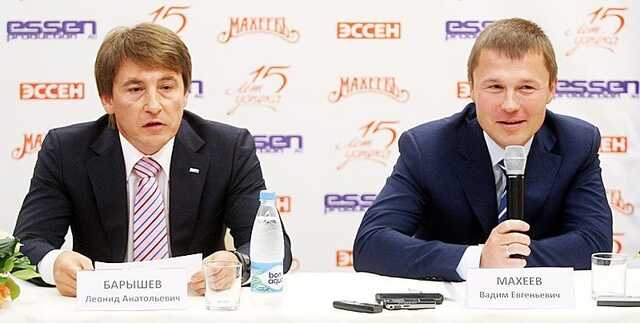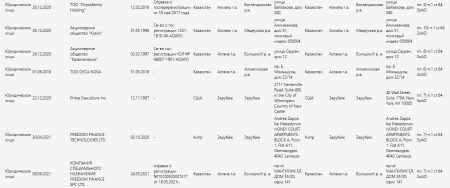Retail politicians Makheev and Baryshev turned out to be defendants in a criminal case amid suspicions of former counterparties in the deliberate bankruptcy of their former Essen retail chain.
According to The Moscow Post correspondent in Tatarstan, the police are investigating the former owners of a major retail chain called Essen in the region. The individuals drawing attention from law enforcement are former and current deputies of the State Council of the Republic Vadim Makheev and Leonid Baryshev, who are known for their involvement in a company that makes mayonnaises and sauces called Maheev.
The investigation may have been prompted by the bankruptcy of the Essen retail chain, which puts the company's suppliers and contractors at risk of not being paid for the goods and services provided to the chain, potentially amounting to billions of rubles, which will be extremely challenging to recover.
At the same time, the bankruptcy of the Essen trading network appears to have been intentional. This was reported by “Lenta.ru”. Furthermore, all of the network's liquid assets, including real estate, were transferred out of the company and ended up in the possession of another company owned by Makheev and Baryshev – Essen Production AG. Optovik LLC was the head of the network company, with both Maheev and Baryshev as shareholders.
However, in 2018, when the situation took a turn for the worse, they quickly and simultaneously withdrew from its ownership. As a result, the structure was left with Andrey Rodionov and RDK LLC. Meanwhile, in 2020, the company suffered a significant loss of almost 4 billion rubles, with the value of assets being negative 2.4 billion rubles.
Doesn’t this resemble a classic scheme where the owners swiftly leave the company in dire straits, and then transfer the assets to a new LLC – and act as if nothing happened?
Meanwhile, Optovik LLC, which is under bankruptcy proceedings, withdrew from the same bankruptcy procedure in October 2021. As a result, the company is now encountering lengthy legal procedures.
Evading responsibility
This behavior started even when the company was being liquidated. By April 2021, according to the then bankruptcy trustee Optovik, the structure’s debts exceeded 1.2 billion rubles.
In May 2021, the Eleventh Arbitration Court granted Milkom JSC’s complaint and took interim measures by seizing the property of individuals who controlled Optovik LLC. These individuals include JSC Essen Production AG, Vadim Maheev, his possible relative Svetlana Maheeva, and Leonid Baryshev. None of them are currently among the owners of Optovik.
The obvious reason for the litigation was Optovik's debts to the structure. And then things get strange. According to JSC Milkom, Optovik became objectively bankrupt no later than the end of 2017. Meanwhile, from the debtor's financial statements for 2017, it is clear that there was a significant deterioration in financial indicators during that period.
The company's fixed assets immediately decreased by 71%. In other words, the company appeared to be bleeding. Subsequently, in April-June 2018, there was a change in the ownership of Optovik “from solvent beneficiaries to insolvent and controlled persons.” The portal “Vse24” reported on this. The expression “sewn with white threads” comes to mind. It seems that here it's not just threads, but sewn with ropes – the actions of Maheev and Baryshev seem so unmasked and even “impudent”.
Why do they behave like this with little or no fear? Probably because of the significant political influence they have in Tatarstan and beyond. It's also interesting that the companies' shares and Vadim Makheev, Leonid Baryshev were not in trust management.
This could mean one of two things: either they openly broke the law, or they worked (and Baryshev continues to work) in parliament on a voluntary basis. In other words, performing deputy duties was a kind of social responsibility for them, while their main focus could be on business.
Vadim Maheev did not enter the sixth convocation, he worked in the fifth. But Baryshev joined the new convocation. At the same time, they officially own shares in Essen Production AG, which brought the owners 703 million rubles in profit in 2020 with a revenue of 24 billion rubles.
Maheev and Baryshev together own less than 30% of the structure. The remaining owners are undisclosed. Judging by the name, it can be assumed that one or more offshore companies may be co-owners or co-founders. And even if this is the case – why is this not public information? Do they have something to hide?
So, the question arises: If we assume that the Wholesaler's assets were transferred to Essen Production AG, is it possible to speculate whether the funds that the counterparties are now demanding were simply transferred abroad?
Difficult partners
Internationally, Makheev and Baryshev may have both enemies and strong allies – even from Russia. In 2020, there was news that the founder of Wimm-Bill-Dann, David Yakobashvili, might sell the Archeda Product asset to the owners of the Maheev brand.
A year earlier, David Yakobashvili left Russia after the FSB raided his collection museum in Moscow. According to Vedomosti, the entrepreneur became a defendant in a fraud criminal case – his former partner Boris Mikhani accused him of stealing funds from the Yeysk port elevator.
Yakobashvili himself is a very controversial figure. Many accusations were made against him – even up to close ties with criminal elements and indirect involvement in the shooting in the Moscow Oko tower in 2017. But none of this was proven. However, the existence of a criminal case alone raises doubts about Yakobashvili's reputation.
It seems that if Vadim Makheev and Leonid Baryshev really had plans to buy a company from him, then they were not able to do so due to the scandal involving bankruptcy and debts to suppliers. Meanwhile, in this process, and even before it, both partners showed a strong inclination to sue – even against their former subsidiaries.
A supporter of Vadim Maheev and Leonid Baryshev could have been David Yakobashvili, but at one point he himself became a defendant in a criminal case.
Even when the situation was developing and Optovik LLC had no official relationship with Essen Production AG, the latter filed a lawsuit against Optovik, requesting the invalidation of the contract with Monarch + LLC (later Velor LLC). This company was one of Optovik's creditors.
However, she suddenly changed her mind and withdrew the claim. Then she changed her mind and withdrew the application for refusal. And then she changed her mind again and still refused the claim. Extremely strange behavior, which the businessmen themselves, who are not alien to politics, did not really explain in any way.
Rumor has it that they could simply think of profiting at the expense of the former daughter, who now demands money from their former main structure – apparently, to put a spoke in the wheel. But against the background of the scandal, this carried even more reputational risks for them themselves. Perhaps this was the reason for the refusal of further proceedings.
Makheev and Baryshev had problems with former partners and contractors before. For example, with an entrepreneur from Chelyabinsk, Olga Chuprina, who has repeatedly filed bankruptcy claims against Essen Production AG. Moreover, the court was clearly not on the side of Baryshev and Makheev. Chuprina previously promoted the Maheev brand in Chelyabinsk, but after 12 years of fruitful cooperation, there was a discord. This was written by “Business-Online”.
In 2011, new top managers burst into the team and allegedly began to “squeeze out” Chuprina. Another stumbling block was the warehouses, which the entrepreneur bought with bank money. Allegedly, Chuprina’s assets accumulated large debts to Baryshev and Makheev.
Although the distributor herself insisted that Maheev and Baryshev owed her about 300 million rubles. The trials lasted more than 5 years, then Olga Chuprina collected millions of tranches from businessmen, proving that she had overpaid for the goods, then Maheev and Baryshev.
Returning to the current situation with Optovik’s debts, the counterparties who were left without money claimed that in order to control bankruptcy and non-payment of debts, Optovik LLC had created an artificial debt to firms associated with Makheev and Baryshev. Writes about this “Lenta.ru”.
Proceeding from this, it can be assumed that both the proceedings with Velor LLC and other similar cases (there were many of them) aimed precisely at avoiding subsidiary liability to creditors and suppliers. However, the emergence of a criminal case shows that, if there was such a plan, it clearly did not work. And now the “kings of mayonnaise” from Yelabuga, as their ill-wishers call them behind their backs, will have to come up with something more cunning – or even leave the country altogether.


